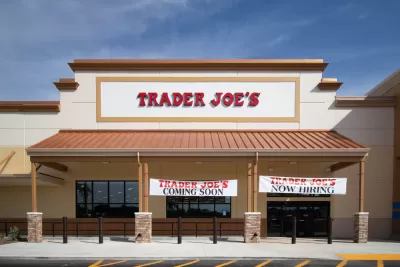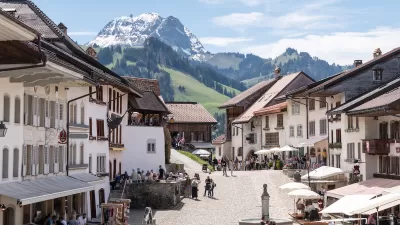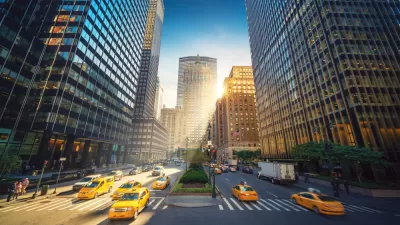The flawed logic behind an all-too-common planning misconception.

Writing in Strong Towns, Daniel Herriges warns against a common style of public comment that fails to grasp the realities of how development decisions are made. Herriges illustrates this genre of uninformed, self-serving comments as “The city should put a Trader Joe's there.”
As Herriges explains, “The reason the city can’t put a Trader Joe's there is because the city doesn't make that decision at all.” The process involves many more parties, such as the landowner and Trader Joe’s. And while rezoning processes often garner public attention, “it’s very rare that a local government actively recruits a specific business to occupy a site, let alone when that site itself is private property.”
While such complaints can largely be attributed to “simple ignorance,” Herriges writes, “there’s something deeper going on: a flaw in the basic mental model that people use to describe how their neighborhood takes shape.”
For Herriges, the problem rests in part on the assumption that there is a master planner or designer making decisions about how a city grows, even if that planner is some vague version of “the community” or “the city.” But most decisions are made by many individuals and entities with often disparate interests.
Ultimately, Herriges encourages people invested in the future of their communities to think about the specifics of what “we” and “they” mean in the urban planning and development context, what concrete outcomes they want to see, and how decisions about those outcomes are actually made.
FULL STORY: “The City Should Put a Trader Joe’s There” (and Other Muddled Thinking About Development)

Alabama: Trump Terminates Settlements for Black Communities Harmed By Raw Sewage
Trump deemed the landmark civil rights agreement “illegal DEI and environmental justice policy.”

Planetizen Federal Action Tracker
A weekly monitor of how Trump’s orders and actions are impacting planners and planning in America.

Why Should We Subsidize Public Transportation?
Many public transit agencies face financial stress due to rising costs, declining fare revenue, and declining subsidies. Transit advocates must provide a strong business case for increasing public transit funding.

Understanding Road Diets
An explainer from Momentum highlights the advantages of reducing vehicle lanes in favor of more bike, transit, and pedestrian infrastructure.

New California Law Regulates Warehouse Pollution
A new law tightens building and emissions regulations for large distribution warehouses to mitigate air pollution and traffic in surrounding communities.

Phoenix Announces Opening Date for Light Rail Extension
The South Central extension will connect South Phoenix to downtown and other major hubs starting on June 7.
Urban Design for Planners 1: Software Tools
This six-course series explores essential urban design concepts using open source software and equips planners with the tools they need to participate fully in the urban design process.
Planning for Universal Design
Learn the tools for implementing Universal Design in planning regulations.
Caltrans
Smith Gee Studio
Institute for Housing and Urban Development Studies (IHS)
City of Grandview
Harvard GSD Executive Education
Toledo-Lucas County Plan Commissions
Salt Lake City
NYU Wagner Graduate School of Public Service





























